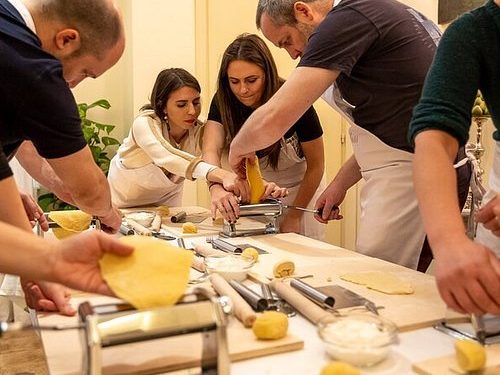Cooking vacations in Italy attract travelers who want more than a typical trip. They want real food, real people and hands-on experiences. They want to understand how each region cooks, grows and prepares ingredients. A Tuscany cooking vacation gives them that chance. It offers slow meals, local traditions and time to explore the countryside.
Many travelers feel tired of rushed city tours. They want a calm holiday where each day has meaning. Cooking trips give them a mix of learning, touring and eating. It is a simple but rich way to enjoy Italy.
Why People Choose Food Based Travel
Food gives you a direct look at any culture. When you visit a kitchen, a farm or a small family restaurant, you connect with the people behind each dish. Cooking vacations in Italy help you slow down and notice these details.
You learn why a region uses certain ingredients. You see how olive oil tastes different from one village to another. You notice the smell of bread baked in stone ovens. You watch pasta made by hand and feel the texture change as you work the dough.
These small moments make the trip memorable. Many travelers say these experiences feel more real than typical sightseeing.
What Makes Italian Cooking Trips Special
Most food trips in Italy focus on local traditions. You cook dishes that families have made for generations. The ingredients come from farms nearby. You can often walk through vineyards, orchards or small markets before you cook.
A Tuscany cooking vacation may include fresh herbs from the garden, tomatoes picked that day and cheeses aged in nearby cellars. You learn how the climate and soil shape each flavor. You also learn simple techniques that you can repeat at home.
The goal is not perfection. It is a connection. You become part of the process rather than watching from the side.
Meeting Local Chefs and Home Cooks
Many trips give you access to chefs and home cooks who live in the region. These people know the stories behind each recipe. They explain why a dish matters, when families eat it and how traditions have changed through time.
Some classes happen in professional kitchens. Others take place in old farmhouses or outdoor patios with long tables. These settings make the experience warm and personal. You cook, talk, taste and enjoy the moment.
Travelers often find that these conversations stay with them long after the trip ends.
Exploring Regional Food Traditions
Italy is full of regional differences. Cooking vacations in Italy give you the chance to understand these differences through hands-on experience. Each region has a distinct style, method and flavor.
For example, Tuscany focuses on simple, earthy dishes. You might cook soups, grilled meats, handmade pasta and rustic desserts. Olive oil is central to almost every meal. Bread is plain and unsalted, which pairs well with hearty stews.
Another region may focus on seafood, stuffed pastas or rich sauces. You can taste and compare these styles to see how the land shapes the food.
Touring Villages and Countryside
Cooking trips usually include touring days. You visit small towns, scenic hills, local wineries or historic squares. These trips help you understand the pace of life in each region.
A Tuscany cooking vacation may include walks through narrow stone streets, visits to ancient churches, time in vineyards or peaceful afternoons in open fields. You may also visit producers who make cheese, olive oil or wine.
These tours balance the cooking sessions. They give you time to rest and explore before returning to the kitchen.
Hands On Learning in a Relaxed Setting
Most cooking sessions are easy to follow. You learn by doing. You chop, mix, knead and taste. You get guidance from your instructor, but the mood stays calm. You are encouraged to enjoy the process rather than worry about mistakes.
Many travelers say the cooking feels like a small gathering of friends. You talk, laugh and learn together. You sit down afterward to eat what you prepared. This shared meal brings everyone closer.
Simple dishes often feel the most rewarding because you understand every step that went into them.
Understanding Ingredients at the Source
One thing that stands out during cooking vacations in Italy is the quality of ingredients. You often see where they come from. You might visit a farm that grows vegetables for your class. You may taste olive oil directly from the mill. You may learn how grapes become wine or how local wheat becomes flour.
When you understand where ingredients come from, the cooking feels more meaningful. You also understand why Italian meals taste the way they do. Freshness, tradition and location shape each dish.
Why Travelers Prefer Slow, Local Trips
Modern travel can feel rushed. People move from one attraction to another without time to connect. Cooking trips create a slower rhythm. You spend time in one region instead of racing across the country.
A Tuscany cooking vacation may include long meals, slow walks, quiet mornings and afternoons in the kitchen. This creates a peaceful experience where you enjoy every moment. You return home with memories that feel rich and grounded.
Bringing Skills and Memories Home
One of the best parts of a cooking trip is how much you take home with you. You carry new skills, but you also carry a deeper respect for food. You learn how to use simple ingredients in thoughtful ways.
You may start cooking with more care at home. You may look for fresh produce, try new recipes or share dishes with friends. The meals you cook will remind you of your time in Italy.
Final Thoughts
Cooking vacations in Italy offer travelers a meaningful way to explore the country. You cook simple dishes with local experts. You explore small towns, farms and cultural sites. You taste regional ingredients and learn how each dish connects to the land.
A Tuscany cooking vacation adds the charm of rolling hills, old villages and warm kitchens. It gives you a calm and memorable experience that blends food, culture and daily life.









































































